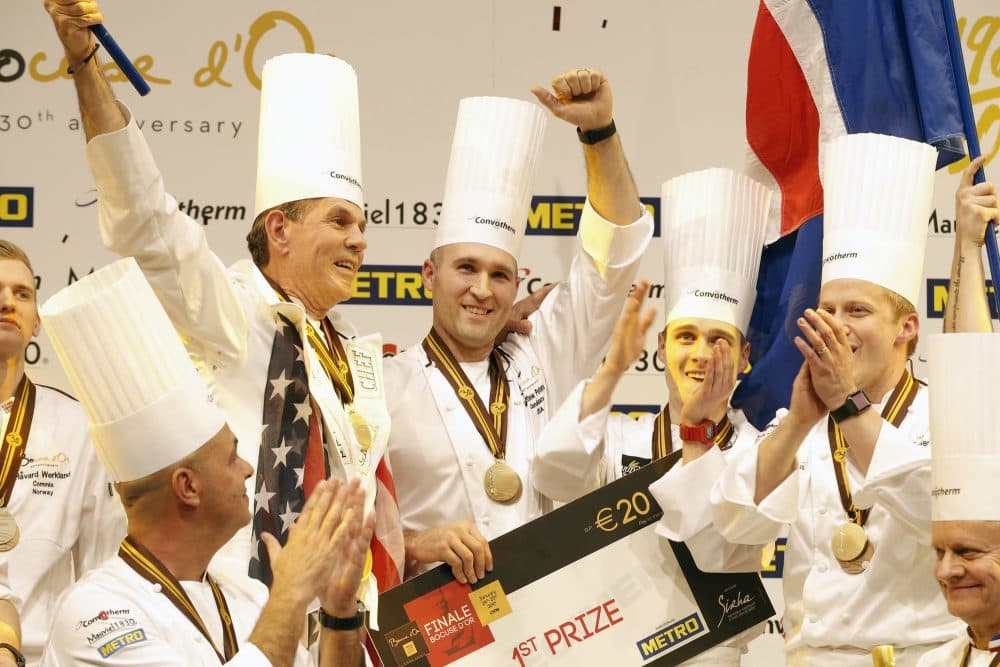Advertisement
Commentary
A Golden Moment — And Missed Opportunity — For American Chefs At The Bocuse d'Or

Last month, a team of chefs from the United States won the Bocuse d’Or for the first time in the biennial contest's 30-year history. As cooking competitions go, this one, started by legendary French chef Paul Bocuse, is the Olympics. But for all the American team's hard-won prestige, there was a notable deficit: The team included not a single woman or person of color.
As last week's Day Without Immigrants strike demonstrated, America's restaurant industry, which suffers from a public image issue when it comes to inclusion, is nevertheless one powered by diversity — one in four restaurant workers, for example, is foreign-born. Yet, in representing the U.S., the boys in Lyon missed an important opportunity to lead the charge in stewarding restaurant kitchens toward equality.
If restaurants, and especially their kitchens, have the potential to represent a cross-section of this country, shouldn't chefs with national and international platforms represent America's diversity in their quest for top honors? The answer is yes -- especially on the global stage, especially now.
...shouldn't chefs with national and international platforms represent America's diversity in their quest for top honors?
I don't suggest that such a team should be compiled for the sake of diveristy alone, but because I know the true colors of the best and brightest scratching out their place in this craft, in this country.
Some of the greatest influences on my career, for example, have been women who deserve to be called, simply, “chef,” without the designation of their gender first. They include big names like Dominique Crenn, who graciously invited me into her San Francisco kitchen at her two Michelin-starred Atelier Crenn while I was struggling to build my first restaurant. From her perch there, Chef Crenn was building a strong and supportive work environment, valuing the creative input of her team, and pushing boundaries by creating a new and modern cuisine all her own.
Another chef who has influenced not just what I cook but where I cook it is Gabrielle Hamilton, who fearlessly created an iconic neighborhood institution where only the new and flashy typically thrived. Hamilton's memoir, Blood, Bones & Butter, offers an honest look at how difficult the restaurant industry can be, but it is also a testament to how luck and a willingness to work very hard create a recipe for success. For anyone. Hamilton's cookbook offers a lesson in detail, process and patience. Her Manhattan restaurant, Prune, melds rustic French and Italian classics that surpass the originals that inspired them. Chef Hamilton punctuates every plate with exacting knife work and inspiration drawn from her life beyond the kitchen.
I can't know if any of these chefs would have any interest in cooking for... the Bocuse d’Or, but I am certain that many who look up to them would, and that they would be qualified to do so.
In Boston, the empire-building and career-launching Barbara Lynch has provided a foundation for an entire generation of cooks and chefs, male and female. Lynch left behind the housing projects of her youth to rise up through — and beyond — the ranks of men who were her contemporaries and competition. She is a champion of fine cuisine, yes, but also of staff development, equality and community involvement. Lynch was outspoken about her restaurants' solidarity with their immigrant workforce during last week's Day Without Immigrants strike.
I can't know if any of these chefs would have any interest in cooking for or coaching or even watching the Bocuse d’Or, but I am certain that many who look up to them would, and that they would bequalified to do so. Consider another chef, José Andrés, who closed his five Washington, D.C., restaurants -- in spite of $100,000 in projected revenue losses — in observance of last week's boycott. For Andrés, immigration is a central concern — roughly 65 percent of his staff are immigrants — and it's personal: Andrés is a naturalized American citizen originally from Spain.
I am proud of Team USA and their coaches. I am inspired by their hard work and dedication to excellence, and by their execution of classic dishes made new. I just wish more chefs across America had the opportunity to look on the victors with the pride of self-identification. Our industry’s banners are held high by women, immigrants and others seeking an equal opportunity, a chance to prove their skill and vision. With so many chefs not represented by Team USA, I am left wondering what message we are sending the world about the true richness of America's culinary landscape.
